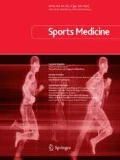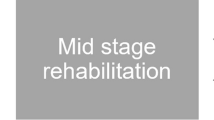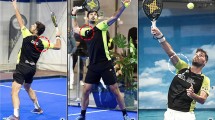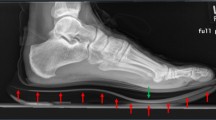Abstract
Participation in the sport of rowing has been steadily increasing in recent decades, yet few studies address the specific injuries incurred. This article reviews the most common injuries described in the literature, including musculoskeletal problems in the lower back, ribs, shoulder, wrist and knee. A review of basic rowing physiology and equipment is included, along with a description of the mechanics of the rowing stroke. This information is necessary in order to make an accurate diagnosis and treatment protocol for these injuries, which are mainly chronic in nature.
The most frequently injured region is the low back, mainly due to excessive hyperflexion and twisting, and can include specific injuries such as spondylolysis, sacroiliac joint dysfunction and disc herniation. Rib stress fractures account for the most time lost from on-water training and competition. Although theories abound for the mechanism of injury, the exact aetiology of rib stress fractures remains unknown. Other injuries discussed within, which are specific to ribs, include costochondritis, costovertebral joint subluxation and intercostal muscle strains. Shoulder pain is quite common in rowers and can be the result of overuse, poor technique, or tension in the upper body. Injuries concerning the forearm and wrist are also common, and can include exertional compartment syndrome, lateral epicondylitis, deQuervain’s and intersection syndrome, and tenosynovitis of the wrist extensors. In the lower body, the major injuries reported include generalised patellofemoral pain due to abnormal patellar tracking, and iliotibial band friction syndrome. Lastly, dermatological issues, such as blisters and abrasions, and miscellaneous issues, such as environmental concerns and the female athlete triad, are also included in this article.
Pathophysiology, mechanism of injury, assessment and management strategies are outlined in the text for each injury, with special attention given to ways to correct biomechanical or equipment problems specific to rowing. By gaining an understanding of basic rowing biomechanics and training habits, the physician and/or healthcare provider will be better equipped to treat and prevent injuries in the rowing population.




Similar content being viewed by others
References
Karlson KA. Rowing injuries. Phys Sports Med 2000; 28: 40–50
Khaund R, Henderson JM. Rowing. In: Mellion M, editor. Sports medicine secrets. 2nd ed. Philadelphia (PA): Hanley and Belfus, 1999: 440–1
Redgrave, S. Injuries: prevention/cure. In: Steven Redgrave’s complete book of rowing. London: Partridge Press, 1992: 200–17
Boland AL, Hosea TM. Rowing and sculling and the older athlete. Clin Sports Med 1991; 10 (2): 245–56
Secher NH. Physiological and biomechanical aspects of rowing: implications for training. Sports Med 1993; 15 (1): 24–42
Karlson KA. Rib stress fractures in elite rowers: a case series and proposed mechanism. Am J Sports Med 1998; 26 (4): 516–9
Gustafsson F, Ali S, Hanel B, et al. The heart of the senior oarsman: an echocardiographic evaluation. Med Sci Sports Exerc 1996; 28 (8): 1045–8
Hannafin JA. Rowing. In: Drinkwater B, editor. The encyclopaedia of sports medicine. Vol. 8. Women in sport. Oxford: Blackwell Science, 2000: 486–93
Bernstein IA, Webber O, Woledge R. An ergonomic comparison of rowing machine designs: possible implications for safety. Br J Sports Med 2002; 36: 108–12
Hickey GJ, Fricker PA, McDonald WA. Injuries to elite rowers over a 10-yr period. Med Sci Sports Exerc 1997 Dec; 29 (12): 1567–72
Roy SH, De Luca CJ, Snyder-Mackler L, et al. Fatigue, recovery, and low back pain in varsity rowers. Med Sci Sports Exerc 1990; 22 (4): 463–9
Teitz CC, O’Kane J, Lind BK, et al. Back pain in intercollegiate rowers. Am J Sports Med 2002; 30 (5): 674–9
Teitz CC, O’Kane JW, Lind BK. Back pain in former intercollegiate rowers: a long-term follow-up study. Am J Sports Med 2003; 31 (4): 590–5
Stallard MC. Backache in oarsmen. Br J Sports Med 1980; 14 (2–3): 105–8
Koutedakis Y, Frischknecht R, Murthy M. Knee flexion to extension peak torque ratios and low-back injuries in highly active individuals. Int J Sports Med 1997; 18 (4): 290–5
Parkin S, Nowicky AV, Rutherford OM, et al. Do oarsmen have asymmetries in the strength of their back and leg muscles? J Sports Sci 2001; 19: 521–6
Reid DA, McNair PJ. Factors contributing to low back pain in rowers. Br J Sports Med 2000; 34: 321–5
Loring SH, Mead J. Action of the diaphragm on the rib cage inferred from a force-balance analysis. J Appl Physiol 1982 53, 756–60
Morris FL, Smith RM, Payne WR, et al. Compressive and shear force generated in the lumbar spine of female rowers. Int J Sports Med 2000; 21: 518–23
Caldwell JS, McNair PJ, Williams M. The effects of repetitive motion on lumbar flexion and erector spinae muscle activity in rowers. Clin Biomech 2003; 18: 704–11
Howell DW. Musculoskeletal profile and incidence of musculoskeletal injuries in lightweight women rowers. Am J Sports Med 1984; 12 (4): 278–82
Urban J, McMullin J. Swelling pressure of the lumbar intervertebral disc: influence of age, spinal level, composition and degeneration. Spine 1988; 13: 179–87
Adams M, Dolan P, Hutton W. Diurnal variations in the stresses on the lumbar spine. Spine 1987; 12: 130–7
Manning TS, Plowman SA, Drake G, et al. Intra-abdominal pressure and rowing: the effects of inspiring versus expiring during the drive. J Sports Med Phys Fitness 2000; 40 (3): 223–32
Voliantis S, McConnell AK, Koutedakis Y, et al. Inspiratory muscle training improves rowing performance. Med Sci Sports Exerc 2001; 33 (5): 803–9
McGregor A, Anderton L, Gedroyc W. The assessment of intersegmental motion and pelvic tilt in elite oarsmen. Med Sci Sports Exerc 2002; 34 (7): 1143–9
Taimela S, Kankaanpa M, Luoto S. The effect of lumbar fatigue on the ability to sense a change in lumbar position: a controlled study. Spine 1999; 24 (13): 1322–7
Orlando K. Key hints for physios to help rowers stay on the water. Momentum 2000; 24 (2): 17–8
Richardson C, Jull G. Muscle control: what exercises would you prescribe? Man Ther 1995; 1 (1): 2–10
O’Sullivan P, Alison G, Twomey L. Evaluation of specific stabilising exercises in the treatment of chronic LBP with the radiological diagnosis of spondylosis or spondylolisthesis. Spine 1997; 22: 2959–65
O’Kane JW, Teitz CC, Lind BK. Effect of preexisting back pain on the incidence and severity of back pain in intercollegiate rowers. Am J Sports Med 2003; 31 (1): 80–2
Soler T, Calderon C. The prevalence of spondylolysis in the Spanish elite athlete. Am J Sports Med 2000; 28 (1): 57–62
Timm KE. Sacroiliac joint dysfunction in elite rowers. J Orthop Sports Phys Ther 1999; 29 (5): 288–95
Congeni J, McCulloch J, Swanson K. Lumbar spondylolysis: a study of natural progression in athletes. Am J Sports Med 1997 Mar-Apr; 25 (2): 248–53
Standaert CJ, Herring SA, Halpern B, et al. Spondylolysis. Phys Med Rehabil Clin N Am 2000 Nov; 11 (4): 785–803
Garry JP, McShane J. Lumbar spondylolysis in adolescent athletes. J Fam Pract 1998 Aug; 47 (2): 145–9
Sys J, Michielsen J, Bracke P, et al. Nonoperative treatment of active spondylolysis in elite athletes with normal x-ray findings: literature review and results of conservative treatment. Eur Spine J 2001 Dec; 10 (6): 498–504
Sasso RC, Ahmad RI, Butler JE, et al. Sacroiliac joint dysfunction: a long-term follow-up study. Orthopedics 2001 May; 24 (5): 457–60
Warden SJ, Gutschlag FR, Wajswelner H, et al. Aetiology of rib stress fractures in rowers. Sports Med 2002; 32 (13): 819–36
Holden D, Jackson DW. Stress fracture of the ribs in female rowers. Am J Sports Med 1985; 13: 342–8
Christiansen E, Kanstrup IL. Increased risk of stress fractures of the ribs in elite rowers. Scand J Med Sci Sports 1997; 7 (1): 49–52
Galilee-Belfer A, Guskiewicz KM. Stress fracture of the eighth rib in a female collegiate rower: a case report. J Athl Train 2000; 35 (4): 445–9
Maffulli N. Stress fracture of the sixth rib in a canoeist. Br J Sports Med 1990; 24: 247
Gaffney KM. Avulsion injury of the serratus anterior: a case history. Clin J Sports Med 1997; 7: 134–6
McKenzie DC. Stress fracture of the rib in an elite oarsman. Int J Sports Med 1989; 10: 220–2
Read MTF. Case report: stress fracture of the rib in a golfer. Br J Sports Med 1994; 28: 206–7
Lord MJ, Ha KI, Song KS. Stress fractures of the ribs in golfers. Am J Sports Med 1996; 24 (1): 118–22
Gregory PL, Biswas AC, Batt ME. Musculoskeletal problems of the chest wall in athletes. Sports Med 2002; 32 (4): 235–50
Davis BA, Finoff JT. Diagnosis and management of thoracic and rib pain in rowers. Curr Sports Med Reports 2003; 2: 281–7
Thomas PL. Thoracic back pain in rowers and butterfly swimmers: costovertebral subluxation. Br J Sports Med 1988; 2 (2): 81
Abbott AE, Hannafin JA. Stress fracture of the clavicle in a female lightweight rower. Am J Sports Med 2001; 29 (3): 370–2
Watson L. The shoulder. Hawthorn: Australian Clinical Educators, 1996: 135
Rehak DC. Pronator syndrome. Clin Sports Med 2001; 20 (3): 531–40
Williams JGP. Surgical management of traumatic non-infective tenosynovitis of the wrist extensors. J Bone Joint Surg 1977; 59-B (4): 408–10
Chumbley EM. Evaluation of overuse elbow injuries. Am Fam Phys 2000; 61 (3): 691–700
du Toit P, Sole G, Bowerbank P, et al. Incidence and causes of tenosynovitis of the wrist extensors in long distance paddle canoeists. Br J Sports Med 1999; 33: 105–9
Nowak DA, Hermsdorfer J. Digit cooling influences grasp efficiency during manipulative tasks. Eur J Appl Physiol 2003; 89: 127–33
Hanlon DP, Luellen JR. Intersection syndrome: a case report and review of the literature. J Emerg Med 1999; 17 (6): 969–71
Roach MC, Chretien JH. Common hand warts in athletes: association with trauma to the hand. J Am Coll Health 1995; 44 (3): 125–6
Tomecki KJ, Mikesell JF. Rower’s rump. J Am Acad Derm 1987; 16 (4): 890–1
Sykora C, Grilo CM, Wilfley DE, et al. Eating, weight, and dieting disturbances in male and female lightweight and heavyweight rowers. Int J Eat Disord 1993; 14 (2): 203–11
Pacy PJ, Quevedo M, Gibson NR, et al. Body composition measurement in elite heavyweight oarswomen: a comparison of five methods. J Sports Med Phys Fitness, 1995; 35 (1): 67–74
Carter JEL, Yuhasz MS. Kinanthropometry of Olympic athletes. In: Carter JEL, editor. Physical structure of Olympic athletes. Basel: Karger, 1982: 18
Lebrun CM, Rumball JS. Relationship between menstrual cycle and athletic performance. Curr Wom Health Rep 2001; 1: 232–40
Lebrun CM, Rumball JS, et al. Female athlete triad. J Sports Med Arthroscopy Rev 2002; 10 (1): 23–32
Koutedakis Y, Pacy PJ, Quevedo RM. The effects of two different periods of weight-reduction on selected performance parameters in elite lightweight oarswomen. Int J Sports Med 1994; 15 (8): 472–7
Backus R. Rowing medicine. In: NCCP level 2 technical coaching manual. Toronto: Rowing Canada Aviron, 1995: 1–10
Acknowledgements
Jane S. Rumball is a member of the Canadian National Rowing Team. Stephen Di Ciacca and Karen Orlando are physiotherapists for the Canadian National Rowing team, and Dr Constance M. Lebrun is a physician for Rowing Canada Aviron. No sources of funding were used to assist in the preparation of this review. The authors have no conflicts of interest that are directly relevant to the content of this review.
Author information
Authors and Affiliations
Corresponding author
Rights and permissions
About this article
Cite this article
Rumball, J.S., Lebrun, C.M., Di Ciacca, S.R. et al. Rowing Injuries. Sports Med 35, 537–555 (2005). https://doi.org/10.2165/00007256-200535060-00005
Published:
Issue Date:
DOI: https://doi.org/10.2165/00007256-200535060-00005




